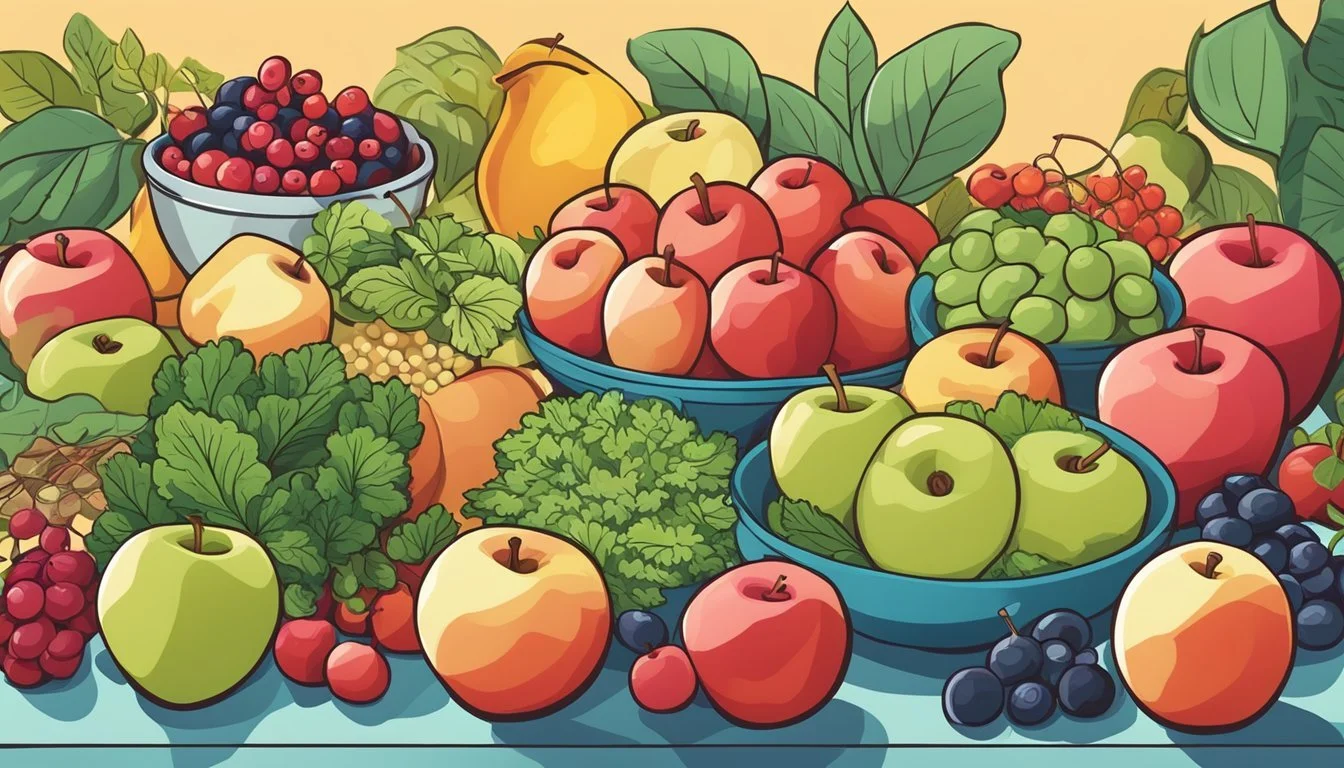How Much Quercetin-Rich Foods to Boost Immunity
Optimal Intake Guidelines
Quercetin is a flavonoid that naturally occurs in a variety of fruits, vegetables, and grains. Acknowledged for its antioxidant properties, it plays a pivotal role in promoting immune health due to its ability to modulate the body's inflammatory response and protect against free radicals. A balanced immune system relies on a harmony of protective factors, of which quercetin is often highlighted by nutritionists and healthcare professionals for its potential benefits.
Consuming foods rich in quercetin not only supports the immune system but may also provide added health benefits. Foods such as kale, cherry tomatoes, and blueberries are readily accessible sources of quercetin and can be easily integrated into daily diets. These foods contribute to the body's quercetin intake and are coupled with other essential nutrients that collaboratively enhance overall health.
Research continues to examine the precise impact of quercetin on immune support, with emerging studies suggesting that a diet incorporating quercetin-rich foods can be beneficial. While the optimal amount of quercetin for immune support has not been definitively established, regular consumption of these foods in a balanced diet is widely considered advantageous. Individuals are encouraged to consider including quercetin-rich foods in their eating habits to support immune function and promote a healthy lifestyle.
Quercetin: Understanding the Basics
Quercetin is a naturally occurring compound with a reputation for bolstering the immune system. This section delves into what quercetin is and where it can be found.
Definition and Classification
Quercetin is a type of flavonoid, a class of antioxidants commonly found in plants. Flavonoids are known for their health-promoting properties, including their potential role in inflammation reduction and immune system support. As an antioxidant, quercetin helps neutralize free radicals, thus potentially mitigating damage to cells and tissues.
Natural Sources of Quercetin
Quercetin is present in a broad array of plant-based foods. Incorporating these quercetin-rich foods into one's diet is a natural way to take advantage of its benefits:
Fruits: Apples, berries, and grapes.
Vegetables: Onions, peppers, and asparagus.
Grains: Buckwheat and capers. (What wine goes well with capers?)
Beverages: Tea and red wine.
Regular consumption of these foods can contribute to an individual’s overall intake of antioxidants, including quercetin, which supports the immune system.
Health Benefits of Quercetin
Quercetin is a flavonoid with multiple health benefits, primarily known for its antioxidant and anti-inflammatory properties. It supports the immune system and offers potential protection against various diseases.
Antioxidant Properties
Quercetin serves as a powerful antioxidant, protecting cells from free radical damage. By neutralizing these harmful particles, it helps maintain cellular health and reduces oxidative stress.
Supporting Immune Function
The immune system benefits from quercetin due to its ability to moderate immune response and combat allergens, viruses, and carcinogens. Regular consumption of quercetin can aid in maintaining a balanced and responsive immune system.
Anti-Inflammatory Effects
Quercetin exhibits anti-inflammatory actions, which can alleviate the symptoms of chronic inflammatory diseases. Through the inhibition of inflammatory pathways, it contributes to reducing the risk and impact of inflammation-related conditions.
Cardiovascular Protection
Its cardiovascular benefits are significant; quercetin may help lower blood pressure and reduce the risk of heart disease by improving vascular function and aiding in the reduction of inflammation in the cardiovascular system.
Potential in Cancer Prevention
Research indicates potential for quercetin in cancer prevention. Its antioxidant and anti-inflammatory properties may play a role in reducing the initiation, development, and progression of some cancers. However, more research is needed to establish conclusive effects.
Nutrition and Quercetin
Quercetin is a flavonoid that is abundant in various fruits and vegetables, offering potential benefits for immune support. An optimal intake of these foods can help maintain a healthy diet rich in antioxidants.
Quercetin in Fruits and Vegetables
Fruits are a prime source of quercetin, with apples and berries being particularly rich in the compound. One should consider including a variety of fruits such as citrus fruits, known for their vitamin C content, and grapes, which provide resveratrol in addition to quercetin, in their diet.
Apples: Highest concentration in the skin
Berries: Strawberries, blueberries, and blackberries
Citrus fruits: Oranges, grapefruits, and lemons
Grapes: Red and black varieties contain higher levels
Vegetables also contribute to quercetin intake. Incorporating vegetables like kale, broccoli, tomatoes, and asparagus into meals can further enhance one's quercetin consumption. Among these, kale stands out for its overall nutrient profile.
Kale: Also a rich source of vitamins A, K, and C
Broccoli: Offers additional fiber and vitamin C
Tomatoes: Contain the antioxidant lycopene as well
Asparagus: Provides folate and fiber
Other Quercetin-Rich Foods
Beyond fruits and vegetables, there are other dietary sources worth noting. Buckwheat and green tea are excellent alternatives for those looking to diversify their sources of quercetin. Red wine, often cited for its resveratrol content, is also a notable quercetin provider.
Buckwheat: A pseudo-cereal that is gluten-free
Green tea: Contains a variety of beneficial polyphenols
Red wine: To be consumed in moderation for its antioxidant properties
Including these foods in a balanced diet can aid in harnessing the immune-supportive properties of quercetin while also providing a host of other nutritional benefits.
Quercetin as a Supplement
Quercetin supplements are available for those who seek to enhance their dietary intake, often resorted to for immune support and anti-inflammatory benefits. These supplements typically range in dosage from 500 to 1,000 mg per day.
Benefits and Use
Quercetin, a natural flavonoid found abundantly in plants, is known to have antioxidant properties. Supplemental quercetin is used for its potential to support the immune system and reduce inflammation. It's suggested that it may aid in improving cardiovascular health as well.
Bioavailability and Absorption
The bioavailability of quercetin, reflective of how well it is absorbed into the bloodstream, varies. Factors influencing bioavailability include the form of quercetin—such as whether it's in a supplement or food—and its combination with other substances. For instance:
Combining quercetin supplements with vitamin C or bromelain may enhance absorption.
Some studies suggest that the bioavailability of quercetin from supplements could be lower than that from food sources due to differences in chemical form and presence of additional dietary components.
Quercetin Supplements vs. Food Sources
Quercetin is naturally present in many fruits and vegetables; however, supplements offer a concentrated dose. Here's a consideration of the two sources:
Supplements:
Provide a higher, controlled dose
Can be standardized for consistent quercetin content
Food Sources:
Offer a complex matrix of nutrients including fiber and other flavonoids
Typically have lower quercetin content per serving
Although supplements offer convenience and high potency, incorporating a variety of quercetin-rich foods into one's diet provides a broader range of nutritional benefits. It is important to note that combining supplements like quercetin with dietary components such as zinc and bromelain may be synergistic, potentially enhancing the overall immune-supportive effects.
Integrating Quercetin Into Your Diet
Quercetin is a flavonoid found in various fruits and vegetables, known for supporting the immune system. To reap its benefits, it's essential to understand the optimal daily intake and how it works in harmony with other nutrients.
Daily Requirements and Safe Dosage
The average daily intake of quercetin from dietary sources is typically between 5 to 40 milligrams (mg), but can be as high as 200 to 500 mg for those who consume an abundance of fruits and vegetables. Quercetin supplements often recommend dosages between 500 and 1,000 mg per day. However, it's crucial to approach supplementation with caution, as excessive intake can lead to adverse effects.
Recommended Quercetin-Rich Foods:
Apples
Onions
Berries
Citrus fruits
Leafy greens
Red grapes
Tomatoes (especially cherry tomatoes)
Broccoli
Green tea
Synergy with Other Nutrients
Quercetin's bioavailability and efficacy can be enhanced when consumed with other nutrients. Vitamins such as vitamin C and certain minerals work synergistically with quercetin, improving its absorption and utilization by the body.
Nutrient Benefit with Quercetin Vitamin C Enhances absorption Zinc Aids in immune system support
Combining quercetin-rich foods with these nutrients can help maximize the immune-supporting effects.
Consultation with Healthcare Providers
Before adding quercetin supplements to one's diet or significantly increasing the intake through foods, individuals should consult a healthcare provider. Doctors can provide guidance on safe dosages and ensure that quercetin does not interact with any existing medications or health conditions. It is also vital to consider that dietary needs can vary based on individual health profiles.
Quercetin Interactions and Side Effects
While quercetin is generally considered safe when obtained from food sources, it can interact with certain medications and cause adverse reactions when taken in supplement form. It's crucial for individuals to be aware of these potential interactions and side effects.
Potential Medication Interferences
Quercetin can interfere with medications by altering their absorption, metabolism, or excretion. Specific drug classes that may interact with quercetin include:
Antibiotics: Quercetin may impact the effectiveness of certain antibiotics by influencing their absorption.
Blood Thinners: It may enhance the effect of blood thinners such as warfarin, leading to an increased risk of bleeding.
Chemotherapy Drugs: Since quercetin can act as an antioxidant, it might reduce the effectiveness of certain chemotherapy agents.
This is not an exhaustive list, and individuals should consult healthcare providers before combining quercetin supplements with any medication.
Adverse Reactions
Quercetin supplements are typically well-tolerated, but side effects can occur, especially at higher doses. The most commonly reported side effects include:
Digestive Issues: Symptoms such as nausea, acid reflux, and diarrhea might occur.
Headaches: Some individuals may experience headaches following quercetin supplementation.
In rare cases, high doses of quercetin may lead to kidney damage. Monitoring consumption and consulting with a medical professional can help mitigate the risk of adverse reactions.
Research on Quercetin
Quercetin is a flavonol extensively studied for its potential benefits to the immune system and protective effects against various diseases. Its antiviral, antimicrobial, and neuroprotective properties are of particular interest in clinical research.
Clinical Studies
Recent clinical studies have centered on quercetin's capacity to modulate the immune system and its effects on blood pressure regulation. Evidence suggests quercetin's role in reducing inflammation and acting as an antioxidant, providing potential immune support. The substance has been evaluated for its antihypertensive properties, with outcomes indicating possible blood pressure-lowering effects.
Antiviral: Studies show quercetin interfering with virus replication.
Immune System: Research supports quercetin's influence on immune response modulation.
Blood Pressure: Clinical trials have investigated quercetin for its antihypertensive potential.
Emerging Discoveries
The scope of research on quercetin is expanding, unveiling new areas where this compound may exhibit beneficial effects. Emerging discoveries include:
Neuroprotective: Investigations reveal quercetin may safeguard neuronal cells.
Antimicrobial: Recent studies focus on quercetin's capability of hindering microbial growth.
While research continues to unfold the full potential of quercetin, its positive impacts on health are becoming increasingly recognized.
Broader Impacts of Quercetin
Quercetin, a natural flavonoid found in various fruits and vegetables, has demonstrated potential benefits for immune support and overall well-being. Research indicates its significant contributions to managing chronic conditions and suggesting a useful role in aging and cognitive health.
Effects on Chronic Conditions
Chronic Diseases: Individuals with chronic diseases, such as diabetes and type 2 diabetes, may benefit from quercetin due to its potential to improve blood glucose levels and reduce inflammation. The flavonoid has been linked to protective effects on the arteries, helping to maintain cardiovascular health.
Diabetes: Studies indicate that quercetin might enhance insulin sensitivity and help regulate blood sugar levels, aiding diabetes management.
Role in Aging and Cognitive Health
Aging: Quercetin is thought to have positive effects on aging due to its antioxidant properties. It may help protect cells from oxidative stress, which contributes to the aging process.
Brain Health and Cognitive Function: There is growing interest in quercetin's capacity to support cognitive function, particularly in the context of neurodegenerative diseases like Alzheimer's disease.
Alzheimer’s Disease: The flavonoid's potential neuroprotective properties might make it a candidate for supporting brain health and delaying or mitigating the progression of diseases such as Alzheimer's.
Neurodegenerative Diseases: Quercetin is observed to inhibit inflammation and oxidative stress in the brain, which are key factors in neurodegenerative conditions.







